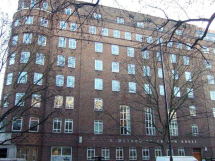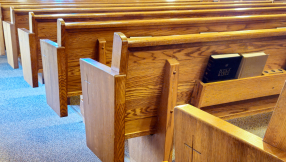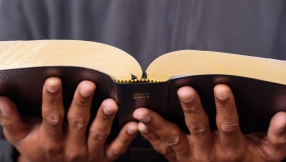
Communion services on social media like Twitter "compromise the integrity of the sacrament", according to a report to be considered by the Methodist Conference later this month.
The high-level report from the denomination's Faith and Order Committee recommends that ministers are banned from celebrating communion using "electronic means of communication". It is likely to prove highly controversial as more churches are experimenting with ways of involving people remotely in worship.
The report follows an attempt by Methodist minister the Rev Tim Ross in 2010 to hold a Twitter Communion. His idea was to tweet a series of prayers which those following the service could say out loud before typing 'Amen' at the end and partaking of the elements at the appropriate point. However, he cancelled the service after pressure from Church authorities and the matter was passed to the Methodist Faith and Order Committee, which has just submitted the report.
Among other things, the report says that while there can be some flexibility about how the Lord's Supper is celebrated, some elements are non-negotiable: "For example, the integrity of the Lord's Supper would be compromised by the gratuitous use of pizza and Coca-Cola instead of bread and wine."
It says that a physical gathering-together of God's people, sharing bread and wine in the same place, is necessary for a Communion service to be valid, saying: "An electronic means of communication, by its very nature, does not physically gather Christians together to celebrate the Lord's Supper and so fails to represent symbolically what the sacrament signifies."
It concludes that: "it is not possible theologically to recognise 'remote communion' ... as being truly the sacrament of the Lord's Supper as this has been received in the Methodist Church".
However, the committee has been criticised for failing to grasp the nature of online community.
Tim Ross told Christian Today that he was "naturally a little disappointed" at the recommendation. "From my perspective, the idea behind remote Communion reinforces the unity of the Church Catholic," he said. "It's a symbolic statement that the Church of Christ is not defined by a parochial togetherness in time and space, but by its universal unity in Christ who, though the power of the Spirit, is always and everywhere present."
He warned that as pressure on ministerial resources grew the question of how to meet people's sacramental needs would become more urgent. "Rather than establishing tight and confining practices, it might be more helpful, at this critical time in the Methodist Church's life, to find a kind of constructive flexibility that will allow room for experiment and see where the God of surprises may lead us," he said.
The move was also criticised by theologians who specialise in social media. Dr Bex Lewis, a research fellow in the CODEC Research Centre for Digital Theology noted that radio stations had broadcast Communion services in which people were encouraged to take part at home for years. She said that she "struggled to understand" why an online Communion would be inappropriate.
She told Christian Today: "In many ways, it is part of a larger debate about the 'reality' of online space. For many of those in the younger generation in particular, online/offline have become redundant terms – let alone virtual/real – as the two seamlessly interweave.
"I can understand the concerns that people have, but I'm yet to be convinced."
Methodist theologian Rev Dr Peter Phillips, himself a former secretary of the Faith and Order Committee and CODEC's director of research, said that the problem lay in the understanding and practice of communion among mainline denominations.
"As long as you believe that a priest or minister must preside at Communion, as these denominations do in varying degrees, and that presiding means performing certain acts, including the taking, blessing, breaking and distributing of the bread and wine, then that act must be done by a real flesh and blood president who can only be located in a real, physical place," he said.
Phillips said that Communion was "both local and translocal" and "a place where time and space combine in worshipping God": "To limit Communion to a local flesh and blood celebration makes a mockery of that."
He added that "while it is true that physical presence seems to be the best way for humans to experience mutual presence with one another, it is wrong to say that it is the only form of presence. We are can be present, even in attenuated form, through the telephone, through Skype, through video."
Phillips concluded that "of course" God could bless bread and wine located in different places and that people in different places could be united in one act of worship.
"The specific problem here is that the Methodist Church, and the other main denominations, cannot fit that to their normal practice and to change that practice would fundamentally undermine key aspects of the way that the Church is managed and Communion celebrated within their churches," he said.
"The problem with Twitter Communion, for me at least, seems not to be theology, but the age-old practice, custom and tradition of the mainline denominations."

















